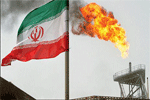China Pulls out of Iran Oil Development

The Iranian regime’s oil minister Bijan Zangeneh said Sunday that China’s state oil company pulled out of a $5 billion deal to develop part of the Gulf State’s massive offshore natural gas field; something that France’s Total SA withdrew from in 2018 over US sanctions.
Written by Shamsi Saadati
The Iranian regime’s oil minister Bijan Zangeneh said Sunday that China’s state oil company pulled out of a $5 billion deal to develop part of the Gulf State’s massive offshore natural gas field; something that France’s Total SA withdrew from in 2018 over US sanctions.
The South Pars field deal, which was agreed upon following the 2015 nuclear deal with world powers. The deal is about to collapse since the Iranian regime starts breaching it. In addition, U.S. sanctions on the Iranian regime have made it harder for foreign companies to do business in Iran.
Zangeneh said that the China National Petroleum Corp. (CNPC) was “no longer in the project”, but did not elaborate on the reason for this, but the oil ministry’s SHANA news agency said CNPC “had pulled out of a contract”.
Iran has the world’s second-largest known reserves of natural gas and the world’s fourth-largest oil reserves, but these have not been developed because of Western sanctions.
The majority of its natural gas reserves come from the South Pars field, which it shares with Qatar. The initial plan was to build 20 wells and two wellhead platforms, which would have the capacity to harness 2 billion cubic feet of natural gas a day.
Per the initial deal, Total had the lion’s share with a 50.1% stake, CNPC had 30%, and Iranian firm Petropars had 19.9%. Zangeneh said that Petropars will now develop the field alone.
Total initially withdrew from Iran in 2006, when United Nations sanctions first came into place because of Iran’s secretive nuclear program and Iran canceled a CNPC contract in 2012 because of rising sanctions that led to the 2015 nuclear deal.
The US began reimposing those sanctions after withdrawing from the nuclear deal and has now largely succeeded in preventing Iran from selling its oil abroad, even sanctioning Chinese shipping firms who were transporting Iranian crude oil.
The Iranian regime, continuing its longstanding blackmailing campaign, started scaling back its commitment to the nuclear deal and launched a series of attacks on tankers and oil infrastructures across the Middle East.
NCRI-FAC
✔
@iran_policy
#Iran Regime Admits Ordering #Houthi Attack on #Saudi Oil Tanker
A commander in the Iranian Regime’s Revolutionary Guards Corps (IRGC) has admitted that the recent attack of two Saudi oil tankers in Bab al-Mandeb Strait by the Yemeni Houthis was…https://www.ncr-iran.org/en/news/terrorism-fundamentalism/25157-iran-regime-admits-ordering-houthi-attack-on-saudi-oil-tanker …
View image on TwitterView image on Twitter
48
22:59 – 8 Aug 2018
Twitter Ads information and privacy
56 people are talking about this
An important point in this contract was that the construction of a 20,000-ton platform with several massive compressors worth $ 2.5 billion to prevent the decline in gas production in this phase and several other phases.
The platform supposed to be ready by 2022, one year after the dramatic decrease in South Pars pressure, and a total of eight to 10 huge $ 20 billion platforms would be built for the South Pars phases.
Only France’s Total and two other western companies are able to build the platform, which is 10 times larger than the current South Pars platforms.
If the massive 20,000-ton platforms are not installed in South Pars, the gas production will fall sharply.
Qatar, which began developing Qatar’s southern part of Qatar ten years earlier than Iran, for years has been installing massive 20,000-ton platforms with the help of Western companies and has already withdrawn 3.5 times more than Iran from South Pars.

